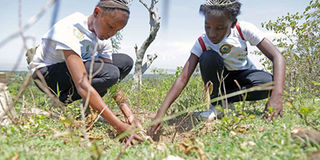Making tree planting work the Equity way

Environment ambassadors plant trees at Koguta forest in Nyakach, Kisumu County, on November 5, 2019. Trees are known to trap atmospheric CO2 and can mitigate the challenges of global warming and climate change. PHOTO | ONDARI OGEGA | NATION MEDIA GROUP
What you need to know:
- Research indicates that tree planting is one of the most effective and cheapest ways of addressing the effects of climate change.
- Equity will finance entrepreneurs to grow their nurseries so that they can provide seedlings for the campaign — thus enhancing livelihood creation.
Extreme weather that has caught the attention of the world, including droughts, forest fires and floods, has underscored the threat that climate change poses to our survival.
The scale of the problem means that addressing it requires the concerted efforts of governments, private sector players, NGOs and the public.
Research indicates that tree planting is one of the most effective and cheapest ways of addressing the effects of climate change.
Trees are known to trap atmospheric CO2 and can mitigate the challenges of global warming and climate change.
It is noteworthy that the Kenya government has committed to increasing the country’s forest cover from the current 7.5 per cent of the land mass, against a target of 10 per cent.
The government has recently embarked on a national campaign that aims to plant 1.8 billion trees.
NEGATIVE APPROACH
These goals are commendable — and, indeed, must be lauded. However, the efforts must go beyond mere pursuit of targets to guarantee sustainability. Despite their good intentions, previous efforts have failed to attain the set targets — and to guarantee their sustainability. That cutting down of trees continues — for a wide variety of reasons — makes the challenge even harder.
The continuous efforts by private sector players, as a means of giving back to society, are also very commendable.
However, the full impact has been watered down by the disparate and ad-hoc nature of these initiatives.
Furthermore, most of these initiatives have treated tree planting as an event, rather than as a delicate process whose success requires that tree seedlings be tended to maturity. Unsurprisingly, many of those that are planted wither.
The realisation that the environmental benefits of trees will only be realised when they are growing and thriving, is what makes the approach that Equity Bank has taken, with their newly-launched tree planting initiative refreshing to tree planting advocates like Kijani Daima.
FINANCIAL BACKING
The bank has committed to planting 35 million trees as part of its efforts to mark its 35th anniversary.
The initiative addresses some of the major challenges facing tree planting in innovative ways, making it a model worth emulating for future initiatives.
For one, tree planting is an expensive affair. It takes money to put seedlings in the ground and tend them into mature trees.
Little wonder that such efforts worldwide have relied on donations that are provided by groups, businesses and concerned citizens through crowd-funding.
Equity is providing a solid financial backing for the initiative, addressing the funding challenge.
Also, finding 35 million seedlings to plant is no small fete. Surprisingly, availability of seedlings is often taken for granted.
To enhance the sustainability of this initiative, Equity will finance entrepreneurs to grow their nurseries so that they can provide seedlings for the campaign — thus enhancing livelihood creation.
PARTNERSHIP
Further, it is not designed as a one-off, ad hoc initiative; rather, it goes beyond the setting of the seeds in the soil to nurturing them to maturity.
For this reason, the initiative will be delivered in partnership with the Kenya Forest Service (KFS), which oversees the forests, to enhance sustainability of the initiatives.
KFS will identify degraded forests that need to be restored, suitable species and supervise proper planting.
By making tree planting work, we can reverse environmental degradation, and increase the chances of unleashing new benefits to the economy and society.
Ms Wanjiku is the founder of Kijani Daima, a tree planting initiative; [email protected]




